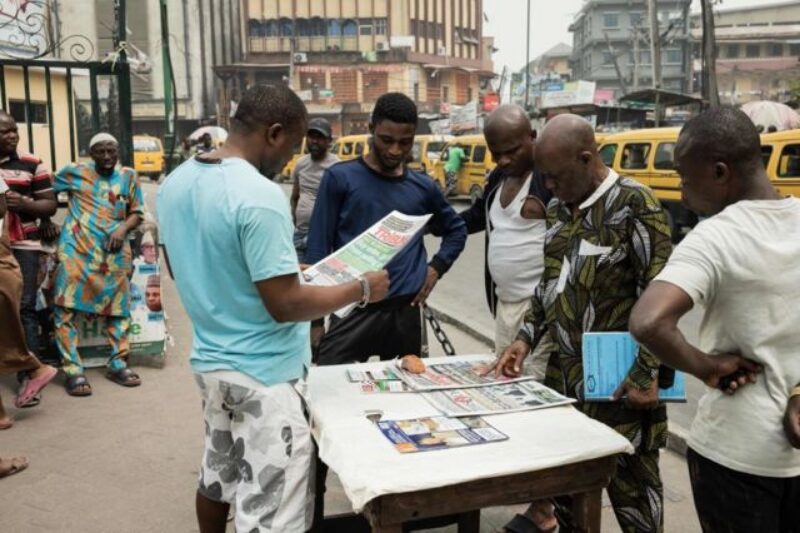Party politics, infighting and allegations of corruption are marring the rollout of palliative food aid promised by the federal government to vulnerable citizens in Borno State.
In the past few years, the cost of living in Nigeria has been on the rise caused mainly by the ever-increasing inflation rate and weakening of the currency.
This escalated when President Bola Tinubu came into power. He announced a raft of reforms, one of which was to suspend the fuel subsidy, sending the price of petrol skyrocketing to new levels; another was his decision to float the naira freely, resulting in a historical fall in the currency against the US dollar.
The cost of living escalated. It hit all Nigerians but Borno State in the northeast – the epicentre of the 14-year insurgency – felt it harshly.
On July 13, Tinubu acknowledged that people needed help and declared a state of emergency on food and at the end of the month he announced that “palliative” aid of ₦5 billion and five trucks of rice would be given to each of the 36 states and the federal capital territory to give some relief poor citizens.
To ensure accountability and transparency in the distribution, a committee was appointed in Borno State. It is headed by Bukar Talba, the commissioner of agriculture and natural resources. The other two members are Sugun Mai Mele, the commissioner for local government and chieftaincy affairs, and Mustapha Mallumbe, the commissioner for budget and planning.
They were tasked with selecting eligible beneficiaries to ensure the appropriate people got the much-needed aid. They also had to appoint sub-committees in each of the 27 local government areas, led by the local political head of each district.
The palliative aid packages include rice, grain, macaroni, spaghetti and oil, as well as non-food items, such as material to make clothes.
By August 23, the state had distributed palliative aid to 400,000 vulnerable households in the Maiduguri Metropolis and the Jere, Gwoza and Kukawa local government areas.
Governor Babagana Umara Zulum said 2.4 million vulnerable people had been given 27,000 bags of rice and the federal government had added 100,000 more bags.
Zulum said: “In these my last four years in office, no vulnerable person in the state will be denied the palliatives provided by the federal and state governments.”
He said not one resident or displaced person in the Maiduguri Metropolis and the 26 local councils would go hungry, despite the “devastating hardship of subsidy removal”.
Last week the communities of Custom, Muna, Ngowm, Bolori, Umarari and Ngarannam communities received their aid packages.
But not all residents were happy.
Some accused committee members of keeping some of the food for themselves. They alleged that some political leaders were involved.
In the communities of Bolori, Umarari and Ngarannam, residents said aid packages were distributed “based on who you know and which party you support”.
This was making it impossible to achieve transparency and accountability.
Before beneficiaries were given the aid packages, they had to have a permit, without which they would not be eligible.
The communities of Custom, particularly the internally displaced persons (IDPs) from Muna and Ngowm, claimed that they had not received any notice about when the permits would be distributed.
They said permits were normally handed out in the morning. However, they claimed the permits were handed out in the early hours at 3am, which resulted in at least 300 men and women going without aid.
They told RNI that although some eligible beneficiaries received aid, many people who were not eligible also got food.
Modu Bukar from the Ngarannam community said: “I didn’t get the palliative. Not all the people who deserved to be given aid were on the list. Instead, the committee gave palliative packages to people who belonged to the same political party or who were relatives.”
He said it would have been better if community leaders, such as the Bulama and the Lawan (traditional ruler), had distributed the packages because they knew the people who needed aid.
Umar Mustapha from the Umarari community said: “Many people who cannot even afford one meal a day did not get any aid, while others who can afford three meals a day did.”
Ibrahim Modu from the Custom community said he had received the palliative but it consisted of only one bag of rice and sorghum grain. The women had been given a carton of macaroni. He said about 3,000 men and women had received aid.
“But I feel sorry for all those who did not get aid. I hope the government will investigate because lots of people are in dire need of food. A few of us gave some of the food we received to our friends who did not receive anything.”
FALMATA MOHAMMED ALI






